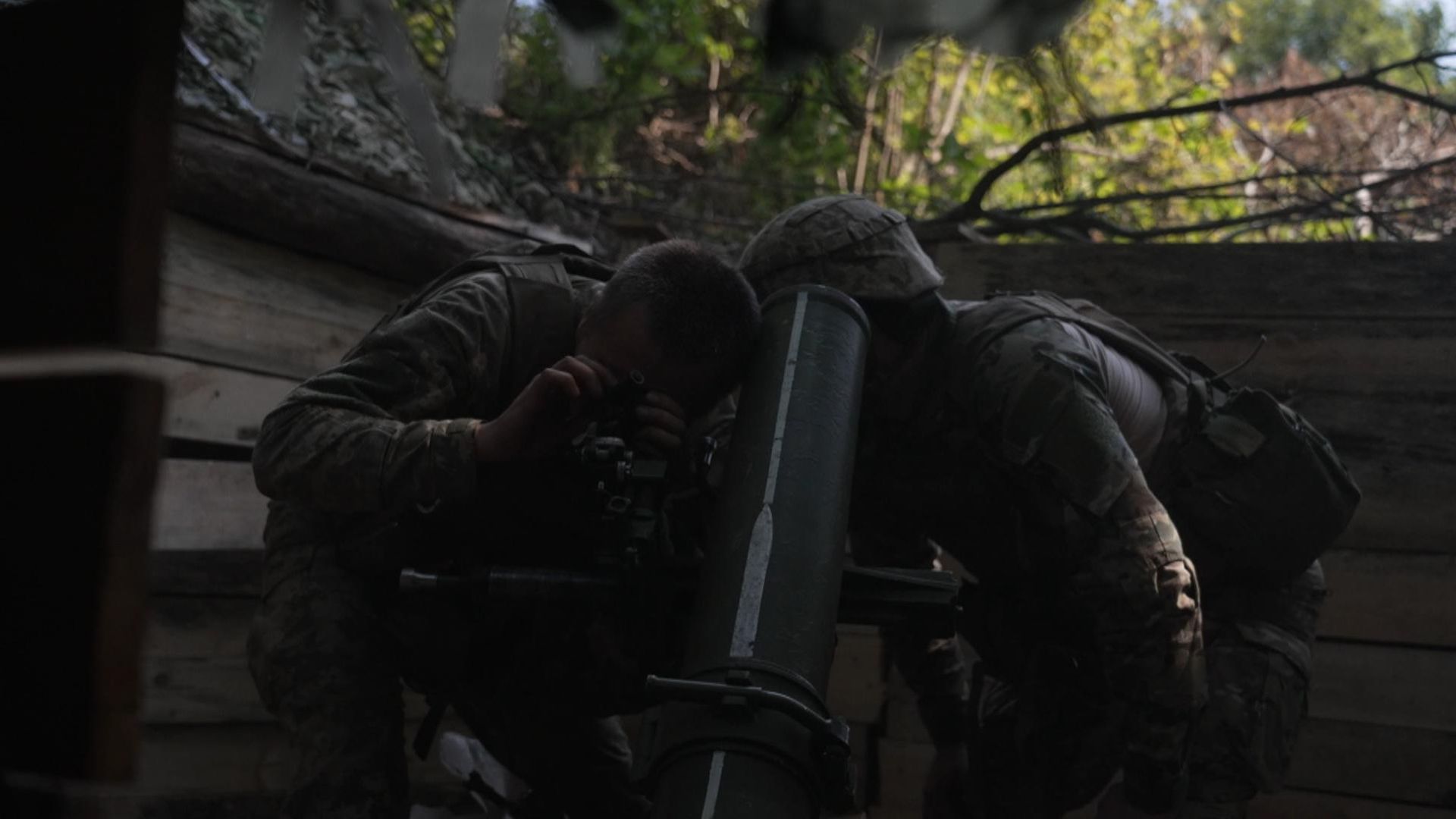The military pickup truck accelerates as it bursts out of a treeline and across an open field towards a Ukrainian mortar position about half a mile from the Russian border.
A soldier sitting in the back with a Sky News team says the extra speed is needed because of the threat from Russian drones.
Once more under the cover of woodland, the vehicle slows slightly as it bumps along a dirt track before pulling into a clearing, still shaded by overhanging branches – a natural shield from any watching eyes or bombs in the sky.
Ukraine war latest: Ukraine blows hole in another Russian bridge
A mortar team, led by a commander called Junior Lieutenant Dmytro, emerges from a makeshift shelter, dug into the earth.
They say their mission on the Ukrainian side of the border in Sumy region has transformed since Ukraine invaded Russia almost two weeks ago.
Instead of firing mortar rounds to defend their territory from the threat of a new Russian assault, they are now striking targets inside Russia’s Sumy region to support Ukrainian forces pushing forward on the ground.
The switch in focus has been a major boost for the soldiers of 117th Separate Brigade, part of Ukraine’s Territorial Defence.
Like most of the rest of the country – and the world – they had not been aware of Kyiv’s invasion plan until it happened on 6 August, but are now proud to be part of the mission.
“With this brilliant operation and seeing how much enemy territory we’ve occupied, I can’t say I’m happy just yet – as I’ll be happy when the war ends – but for now, I’m glad and hopeful,” Dmytro, 45, says.
With his team given a new position to hit on the Russian side of the border, he and his soldiers jog to their mortar – a few dozen metres away through the trees.
They try to minimise time above ground to avoid being spotted by the other side.
The weapon, which fires 120mm shells, is kept at the bottom of a specially built trench.
The troops have constructed two camouflage shutters over the top of the hole to hide the system. They open the flaps only to fire it – then quickly close them again.
We watch as they wait for the coordinates of the target.
Suddenly, the team is alerted to a Russian surveillance drone overhead.
We are told to rush inside a shelter, which forms part of the mortar trench.
After a few minutes, it is deemed safe to emerge but almost immediately an FPV (first person view) drone is spotted and we have to hide again.
These drones are armed with munitions and designed to be crashed into targets, making anyone standing out in the open acutely vulnerable.
A second FPV drone is then seen as well as another surveillance drone.
The mortar team wait for the danger to pass.
Then it is their turn to attack.
The commander receives coordinates over a radio from his headquarters. He relays them to his team, who load the weapon.
“Fire!” shouts Dmytro, his fingers in his ears.
With a boom, the gun launches a shell across the border into Russia.
A minute or two later, the team fires again and again.
Please use Chrome browser for a more accessible video player
In total, they launch five mortar rounds into Kursk region before hiding away the mortar once more and sprinting back to their main shelter.
Racing down wooden steps into an underground room, lined with bunk beds, the soldiers say we all need to stay hidden as a Russian drone is back above us, looking for the firing position.
While they wait, one of the team pulls out his phone and shows us footage from one of their drones of the mortar rounds they had just fired landing on a Russian position.
Read more:
Ukraine destroys key Russian bridge
Putin ally urges Russia and Ukraine to end war
Two of the shells appear to impact near the target. It is possible to see Russian troops running for cover. Then the other rounds come in.
Dmytro says their workload has increased “significantly” since the start of Ukraine’s invasion of Kursk.
Keep up with all the latest news from the UK and around the world by following Sky News
“The supply of ammunition has increased substantially, and we’re working both day and night. I understand that this is to support our forces in Kursk,” he says.
Asked whether he thought his unit will also push into Russia, he says: “If we receive orders, we’ll go… We’ll go wherever we’re directed and carry out our duties.”
As he speaks, a tiny white kitten appears. Named Matilda, she has been adopted by the unit – a welcome light relief from the pressure of war.

Like the rest of his team, the commander was a civilian before he decided to join the territorial defence after Russia launched its full-scale invasion two and a half years ago.
In his civilian life, he was an engineer – a job he longs to return to once the war is over.
He hopes that Ukraine’s counter-invasion into Russia will accelerate an end to the fighting.
Be the first to get Breaking News
Install the Sky News app for free
“Everyone is exhausted, both mentally and physically,” he says.
“We hope [it will end] and have great expectations.”





